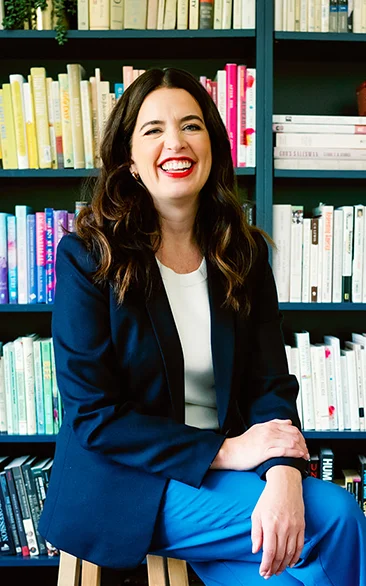Kate Bowler: There a moment there when you feel untouchable, invincible even, lucky some might say. It could be because of big things. You might be at the height of your career or proud of how well your kids are doing or feel like you’re finally getting somewhere in therapy. Or it could be the little things. You might have gotten that super close parking spot or won a give-away or checked everything off of your to-do list today. Honestly, I had a moment like that recently where I was like seated at a basketball game, seated so that I wouldn’t get hit in the face with a T-shirt cannon T-shirt. And then, while seated, the T-shirt landed beside me, and then my seatmate just handed it to me like a, like a just the present that it was. I was like, Oh my gosh, maybe my life is really adding up to something. Those are the moments. And then there are the moments when the math makes no sense at all. When the addiction still has a vice grip or the doctor still has no answers or the marriage is crumbling after you’ve tried absolutely everything. Those moments when no matter how much effort or time or prayer or positive vibes you’ve put into it, nothing seems to change. It doesn’t add up. My name is Kate Bowler, and this is Everything Happens. Today, my guest is someone who has been on the upswing of life, a successful career, a loving wife, all lights that turn green until doesn’t that sound familiar? Until he was interrupted by someone else’s tragedy that upended his ideas of what really matters when life is stripped to the studs? That encounter with grief has enabled him to narrate the thoughts and fears and prayers we all have when life doesn’t add up. Mitch Albom is a bestselling author, journalist, screenwriter, playwright, radio and television broadcaster and musician. No, really. He was in a band called The Rock Bottom Remainders, with other literary geniuses like Stephen King and Amy Tan. You’ll recognize many of Mitch’s fiction and nonfiction books like Tuesdays with Morrie, The Five People You Meet in Heaven, and Stranger in a Lifeboat because they have collectively sold over 40 million copies and have been made into Emmy Award winning movies. Mitch I feel so lucky to be doing this with you today. Thanks so much.
Mitch Albom: Thank you, Kate. I appreciate you’re asking me.
Kate Bowler: Your newest work of fiction Stranger in the Lifeboat asks, I don’t know, maybe the most important question we face in the midst of tragedy and despair, which is what is the point of a faith without guarantees? How did you how did you decide to tackle that head on?
Mitch Albom: First of all, Kate, I tend to write books more about a theme and then I kind of come up with the plot. I’m not really a writer who says I have a great character mind, I want to create a story around him or I have an idea about someone blowing up a shopping mall and create a story about that. I always sort of decide like what area I want to be exploring and then see if I can find a story that illustrates it. So when I wrote The Five People You Meet in Heaven, which was my first novel, for example, I didn’t want to write about heaven per se, I wanted to write about people who think that life doesn’t matter and that they don’t matter. And how could I write a kind of parable that that proves that that wasn’t true, and I ended up coming up with all this thing about heaven and five people tell you what your life meant on Earth, but it wasn’t where I began. And so I wanted to write a story about asking for help and then the way that we do or don’t accept the fact that it takes awhile maybe sometimes. We want our help, you know, like we’re ordering a sandwich you know I want it with mayo and cheese and I want it right now. And if it takes five minutes, it’s like what’s taking so long? And we’re like that with help and God, it’s like, Well, this thing I asked you, I prayed for this yesterday. Why isn’t it here today? And so that became the underpinning of the Stranger in the Lifeboat. Now you notice I’ve talked way longer than I should have, and I never mentioned the plot of the book. And that’s what I mean, is that all that went the thinking before I decided, OK, now the story will be about a bunch of people lost at sea who pull a guy into the boat, who claims to be God and what happens there. So all that kind of is the answer.
Kate Bowler: Wonder if we might talk a little bit more about that surprise of like a completely new chapter in your life where you and your beautiful wife don’t have kids in a traditional sense and then quite unexpectedly, you begin to care for an entire orphanage of kids. How did this large and important responsibility fall into your lap?
Mitch Albom: It fell into my lap. That’s that’s exactly what happened. It fell into my lap. I went down after the 2010 earthquake with a pastor from Detroit who had asked for help because he had had this orphanage and he thought it had been destroyed. And we go down there two weeks after the earthquake because I just couldn’t get the idea of children being buried under rubble and nobody going for them because he was going to go for them that they’re orphans except the person who runs the orphanage. So we went there and it hadn’t been destroyed, but it had been overrun. And and so I started to help out and I was just so taken by the kids. Their attitude is, I mean, if you’ve ever been to Haiti, anyone who’s ever been to Haiti and met the children there knows that they’re just, there’s something else. They’re otherworldly. They have an incredible passion and joy and and happiness despite the world’s second poorest country status. And so I came back and began to bring people back with me. I went back every month that we were building the place of a building the place up, and we built the first toilets, we built the first showers, we built the first kitchen. I didn’t have any of these things when we first got there. But while we were doing this, I noticed that the kids were still starving. You know, they were only eating one cup of rice a day. And so I went to this pastor and I said, I don’t understand where I’m coming down every month and bringing all these guys with me. We’re putting a lot of money and effort into this place. Why aren’t you, you know, feeding the kids better? And he said, Well, the truth is, I don’t have any money to run this place, and I’m 84 years old and I’m not going to have any money to run this place. And I blurted out, and I mean, blurted out like, Well, OK, I could probably run this place if you want to. I run some charities in Detroit. I mean, how hard could it be? And he basically said, Thank you, Jesus. Hallelujah. Here it is. He left and it fell into my lap and we never saw him again. And I’ve been running it ever since and I’ve made every mistake you can make. I’ve, you know, I mean, I’ve just so, so unprepared. And you know, like I said, the one thing I’m good at is being consistent. And I told them I would be there every month and never had to worry, and I’ve never broken that hope. Covid took away a couple of months because we weren’t allowed to fly in. So, you know, now I’ve gotten a few things down, I can speak the language and and, you know, I don’t get fooled a hundred percent of the time.
Kate Bowler: Love really does have a way of like pulling us into unexpected entanglements, which I mean, spin us around and pull us in and tie us up to each other and you write so beautifully about the bossy and adorable Chika. I would love for you to tell me about her. She seems spectacular.
Mitch Albom: I have so many pictures of her around here, I’m hald tempted to just grab one of those and show it to you, but the truth of it is Chika, Chika was born three days before the earthquake of 2010, and she survived it when she was inside this little cinderblock house. And she was on her mother’s chest three days old and the earthquake came and the house collapsed, but the roof was made out of tin and it just slid off the back. And they survived. So you imagine a three day old baby survived an earthquake. She was born tough. And it was always tough. And her mother died two years later in that same cinder block rebuilt structure, giving birth to a baby brother. And she died. So Chika was taken away and she was brought to our orphanage. And for the next few years, she was the bossiest, pushiest toddler we had I mean, there was no question who, when Chika yelled, you could hear her across the whole yard. She was like Ethel Merman size one shoes. And we just, and you can’t help but love a kid who’s telling all the older kids what they can do and where they can go. Her biggest posture was this, you know, she’d stand like that and, you know, she was just speaking and the sentence Oh, that’s Chika was uttered over and over again. At age five, when she was really just coming into herself, we noticed that her face was beginning to droop and we took her to the doctor and she developed a brain tumor, and there was nobody in Haiti that had any idea even what it was or how they could deal with it. And we brought her north hoping that we could get surgery done and and then bring her right back. And it didn’t work out that way. She never went home and we adopted her and we spent two years trying to find a cure for something called DIPG, which if there’s anybody listening to us who knows what that is, they know that it’s basically incurable. And in most cases, the child is gone in four to six months. Chika, we were blessed, she lived two years and we had an amazing two years with her, and she was funny and sassy and all like she’d be sitting in the back of the car and she was singing Doe, a deer an email deer. And we would say, it’s not email Chika, it’s female. And she said, what? Said It’s a female not email. And she thought for a second. She said, No, it’s my mouth and sing it the way I want to. You know that was her, you know, or you would say, I would say I’d sit there like looking at some bills and say Oh boy. She said, Why do you say oh boy. There are no boys here? It’s just something we say here. She said, Well, why don’t you say, Oh girl, you know, like. The most telling thing she ever said to me, I always say, is one time when towards the end of her life, where she couldn’t walk anymore and I had to carry her around. Which is fine by her, you know, she as long as I took her to the bathroom, in the car or couch, or wherever she wanted to go, it was like, you know, raise your arms and OK, now I was the taxi. And I was I was coloring with her and I realized I was late for work and I popped up. I said, Chika, I have to go. When she said no, Mr. Mitch, stay stay and color. I said, Chika, I have to work. And she said, Mr. Mitch, I have to play. And I said, well, not the same thing Chika because, you know, and she crossed her arms, you know, like that. She said, No, it’s not. Your job is carrying me. And I laughed. Then I realized, Wow, I’m never going to hear a truer sentence than that.
Kate Bowler: Yeah, that’s right.
Mitch Albom: Plus, the carrier and one of my favorite pictures is is me holding her at a birthday party, and she’s just looking at me in the way that you know you, every father wants a daughter to look at him, and that was the best job I ever had. That was the best thing I ever filled my arms with. Bless her, and what we carry kind of defines us, you know? And when you’re carrying your child, you’re at your best, you know, you’re at your, you’re at your most useful. Let’s put it that way. Yeah.
Kate Bowler: She, ah the insistence of her love is so- there’s some people who just they they demand to be loved, they their loves need to be carried, and that pull is the best and worst part of being human, isn’t it?
Mitch Albom: Well, yeah, I don’t know about the worst part, but it definitely the best part.
Kate Bowler: I mean, I think it’s the worst part, I mean, the because it’s impossible because the what was it? There’s only one impossible thing, right? This was from I was watching A Room with a View yesterday. It’s the E.M. Forster book. There’s only one thing impossible to love and to part. And I think it’s the gorgeous impossibility of the way we love people is it makes it unimaginable to be without each other.
Mitch Albom: Well, you know, I visit that theme a lot in my books because I have lost a lot of people. I mean, my first book that was of national note was about losing somebody that I cared about my old professor, Morrie Schwartz. And, you know, it was a chronicle of slowly losing him. And so I kind of was birthed in lost stories. So I’m pretty familiar with that impossible emotion that you’re talking about. And you’re right, it is, it’s universal. And there’s not any book that I write that people don’t end up coming up to me and saying, Oh, I felt that when I lost somebody or, you know, that was what it was like when you wrote that part that was including this book, which is about a little bit. And I’ve had enough reactions from people to know that the part that they react the most to is when one of the characters in the boat asks this God character, Why do people have to die? And you know, why do you take them?
Kate Bowler: The grand contradiction always being that there’s just nothing universal about love, always.
Kate Bowler: I imagine when people think of you they know that you’re not new to sitting close to the edge of these big questions of mortality. It’s something that especially with the book Tuesdays with Morrie that I imagine you get a lot of responses to, you’re a big fancy sportswriter, you’re, you know, wildly successful and then an old college professor of yours shows up on an episode of Nightline. A professor that you promise to stay in touch with for people who who don’t necessarily know that story, would you mind telling me about your Tuesdays with Morrie?
Mitch Albom: I had been very close to Morrie Schwartz when I was in college back in the 70s and took all the classes that he offered, majored in sociology because of him and walked around campus with him, had lunches with them. We were really he was more like an uncle to me. You know, that kind of older person you’re always looking for when you go to college, especially. I went when I was very young. I got out of school a year early, and so I really needed somebody to kind of look up to and he was there and he made me promise on the last day of school that I would stay in touch and all that. And then I broke that promise for 16 years while I was getting very quickly ahead and the and the broadcasting sportswriting field and, you know, I was just. Working a 100 hours a week and four or five different jobs, and I was on ESPN television and I was on the radio and I was a syndicated columnist and, you know, was quite full of my own ambition. You know, I hope I wasn’t a jerk to other people, but I can certainly say I wasn’t thinking a whole lot about them. I was mostly just thinking about myself. And in your early thirties and mid-thirties, you can kind of do that. You’re healthy enough and everything’s gone along great. All the lights are turning green for you and you just figure it’s going to go on like this forever. And then I saw Morrie on Nightline talking to Ted Koppel about what it was like to die. Mm-Hmm. I just happened to be flipping the remote control and happened to catch him. Otherwise he would have died, the next time I would have heard about it would have been did you hear that your old professor we love so much is dead. But instead, I saw him and something clicked in. I felt very guilty and I called him and I was going to just call him once, and that was going to be the end of it. But at the time, the phone call was done here, kind of guilt me into coming to visit him. So I flew from Detroit to Boston. I visited him. It was only going to be once. But by the time I was done with the visit, he had kind of guilt me into coming back again. And I came again and again, and I ended up coming every Tuesday for months and months until he passed away and we did this last class together. And what’s important in life when you really know you’re going to die? And it was just me and him. The lessons from that wasn’t ever supposed to be a book. I was just supposed to be this conversation that he and I had. And I began to tape record them so that I would have them forever. And then. Oh, I know halfway through our time together, he told me how in debt he was for his medical bills and how he feared that he was going to die and he was going to die twice because his family didn’t have the money to pay the medical bills. And so after he died, they were going to have to pay to sell the house in order its bills. And he said, that’s going to make me die twice. So I got an idea that maybe I could help him by by doing a book because that’s all I knew how to do. And I went down to New York, unbeknownst to him, in between the Tuesdays and would try to find the publisher, see if somebody was interested in what was going on between me and him. And almost everybody said, no, it was really something when you look back and Tuesdays with Morrie, how many people dismissed it, just outright boring, depressing, you’re a sportswriter, you can’t write a book like this. And I mean, really, if it had been for me, I would have given up because there were so many no’s. Then it’s like, OK, I guess it’s a terrible idea, but because it was for somebody else, which is one of the great lessons of this, you always try harder. I think when it’s for somebody you care about, then for you, necessarily for yourself. Like, I don’t want to let the person down. So we found a publisher a few weeks before Morrie died, and they gave us enough money, just enough money to pay his bills. And I gave it all to him and I said, Here don’t don’t die twice. And, you know, he cried. We had a nice bawk. And for me, I always say that was the end the Tuesdays with Morrie, because I had finally kind of learned a lesson. I had finally learned to do something for somebody else that didn’t involve me or my career, and ironically, it turned out to be the biggest thing I ever did in my career.
Kate Bowler: What are some of the questions that he would ask that really, you think resonate with people?
Mitch Albom: He would ask, Have you, are you satisfied with your life? Are you content with your existence? What do you do for your community? I remember that was a big one and really launched all the terrible things I do because he said he said, What do you do for your community? I said, What do you mean? He said, What do you do for charity, for people around you who don’t have as much as you do? I said, I write checks. And he said, anybody can write a check. You’ve been given a voice and you need to use that voice for more than just aggrandizing yourself, which was the kind of thing that Morrie would say to me. And I remember it because nobody uses the word aggrandize in a sentence, ever. You know, that year I started my first charity and I now run nine charities here in Detroit and the orphanage in Haiti, and that was all from that discussion. So that question was a pretty big question.
Kate Bowler: There is something in finding Chika that I was really hoping that you would say and then you tackle it so head on at the end. You’ve had this front row seat looking backwards at life and then looking forwards at one that was cut short. And I wondered if you would mind reflecting for a minute on on how different those two things are.
Mitch Albom: How can I best put it, when you lose an elder, when you lose a parent? Or a grandparent or a mentor, someone who was older than you. You lose direction, but you don’t lose hope in the world because it makes sense to do that well, this is how the world works. They went sooner than I wanted, but you know, that’s what’s ahead of me. So you lose, you feel like rudderless. Yes. But you, you don’t question the whole world. When you lose a child, it’s not that you lose your sense of direction it’s that you lose your sense of anything making sense. And everything becomes vulnerable and anything can happen to you at any time and all your walls come down that you thought protected you, because if this could happen to this little child, then what’s protecting you? What’s protecting any of your other loved ones? You find yourself as as a parent, I wasn’t Chika’s parent biologically, you know, I felt it in every way, and I certainly was assuming the responsibilities my wife and I. But but more importantly, was the feelings that you get. And it’s like, why her? Why, you know, not her me? You know, I’ll take this off, but let me be the one who’s sick. And when you go to a hospital? With a sick child, and let’s say she’s in the bed and she has to stay overnight or it’s after the surgery and you’re taking shifts with somebody. OK, go home and take a shower. And you leave the hospital. And you get into your car and you say, I’m leaving the hospital and she’s staying in the hospital. There’s something the matter with it. You know this, so all your sense of balance, the way life is supposed to go is off kilter. And that doesn’t happen when an older person dies because you’ve been trained and conditioned to say this is what happens to older people. Eventually, you know they’re going to die. And if depending on their age and their proclivities, they probably said to you, Listen, I’m not going to be here forever. You know, they’ve kind of. Prepped you a little bit. A child doesn’t prepare you. And in fact, the whole time Chika was sick she never knew that she had a terminal illness. She never knew the cancer. Why should she? You know, that was what enabled her to play until the end, you know, until she couldn’t play anymore. Because when we take her to the doctors, we would just say, we’re going to the doctor because, you know, you’re having some trouble with walking or whatever. So he’s going to help try to fix you up. All right, you know. And then, you know, give me this, I want to play with that. Why should I say to you, OK, here’s here’s what a tumor is, and here’s where it is in your brain, and here’s what it’s going to do to you. That’s cruel. And the five year old and a six year old. So, you know, but they don’t know. And that burden, you know, like and you’re going to you’re going to make me cry with these things Kate. But I remember we were in, we were in the hospital room once and something happened. I forget what it was, something at my job and I was on the phone and my wife and I were there and I got all upset over it. And I was saying stuff and we were like about 10 feet away from Chika, and she was kind of sleeping. And I said, I can’t believe that this is happening. And my wife was and we were kind of going back and forth on it, raising our voices a little bit. And Chika said, Hey, guys, hey, guys. And, you know, we looked over when I went over said, What’s the matter, sweetheart? She said, what what? What are you talking about? And I said, It’s nothing, it’s it’s, you know, don’t you worry about it, she said. But, but I want you to stop. Or something like that. And I said, OK, well, because I can’t make you happy and like you realize she’s in the hospital bed, you’re arguing over some stupid thing at your job and she’s thinking about. No, I don’t want this to go on because I can’t make them happy. I like when I make a joke and they laugh and they’re happy. That’s what she reveled in like reveled in making us laugh. It’s just everything’s upside down.
Kate Bowler: Yeah, that’s right.
Mitch Albom: I wouldn’t wish it on anybody. I don’t care if they were mortal enemy. Not that I have mortal enemies. It’s the worst.
Kate Bowler: One of the reasons I love your brain and listening to you put all these hard things side by side, is there such a superhighway we create between the most important things that happen, like the most meaningful things that happen to us and then a desire to immediately simplify it into a series of lessons, and I am like one hundred percent anti-lessons because they’re, in my experience, usually the weaponized piety of the extremely certain. So I never I never buy the simplicity of like the cliches that we have like everything happens for a reason. But there’s such an and intense and important thing that you’re putting in front of us, which is sometimes the worst things that have ever happened to us and the people we love are the things that teach us these profound things. And yet this is a loss that demands to be mourned and I think a lot of people would be tempted to wrap that up with a bow, and I love that you’re saying there’s there’s wisdom, there’s like gorgeous, hard, awful wisdom to be learned in the unthinkable, but nothing like a formula to get out of it. Nothing like a tidy series of answers about ourselves and God.
Mitch Albom: You know, the loss of a of of and the dealing with those questions, that’s, that’s kind of been my whole life of writing anyhow, and it sort of leads to The Stranger in the Lifeboat, which I don’t think I could have written when I was thirty seven or forty five or anything, you know, I think I had to write nine books before it to sort of get to the point where you’re bold enough, brash enough, or maybe an even stronger word to play God in one of your characters. And this may be kind of a challenge, but also interesting in a way that anything different than anything I’ve ever written is that these passengers get to ask God all the questions that if I disappeared from the screen and Kate you had, you know, some preacher came on and said, I’m God, I listen to your podcast, go ahead.
Kate Bowler: Avid listener, amazing, good to hear.
Mitch Albom: First-Time Caller.
Kate Bowler: Strong endorsement.
Mitch Albom: I’m I’m you know, what do you want to know? And I get to ask those questions in the mouths of these characters. So, you know, for example, the one of them asked at one point, Do you answer prayers? And he says, I answer every prayer, but sometimes the answer, you know, which is something that I couldn’t have written 15 years ago, but I can write now. Yeah. Or finally, the biggest one which I mentioned to you before is why do people have to die? And one of the characters who was missing his wife breaks down and says, You know, why did you take my wife? If you’re God, then why did she have to die? Why did you take her? And the answer is, why is it that when people die on Earth human beings say, why did God have to take them? Maybe a better question would be why did God give them to us? You know what we do to warrant or merit their sweetness, their love, their attention? Didn’t you have that with your wife? And he says, I had it every day. And God says, Well, those memories are a gift. But their absence is not a punishment. People don’t die so that I can punish you. I’m not cruel. This is just part of the picture, this part on Earth, and I know that you cry when you lose your loved ones here, but I can assure you they’re not crying. And for me, I could not have written that, I couldn’t have written that five years ago because I was too angry. And before that, I wouldn’t have known it, but, when I think about Chika no longer suffering and no longer crying like she did here and the pain that she was in here, and you realize if you do believe that there is something beyond this world and we’re not just worm food, then you can accept that idea of, you know, we cry, but they’re not crying. You know, and who am I for my wife to deserve to have a five year old when we’re in our fifties? And to have had that joy for two years, we didn’t lose a child, we were given a child. And if you focus on being grateful for being given something, you don’t have time to get angry over having lost it. And that was that’s a bromide or a simple sentence or whatever. It’s the truth. And sometimes truths are just simple like that.
Kate Bowler: When you talk about grief and you talk about the sheer gratitude, not even a big enough word of being given so much love. And I just I just immediately want to say amen. When I think about the things I’ve been given that are not anymore, even though I’m totally scared about the future, I find myself thinking like I look at the past, I think, thank God those things are already mine. Right. I would never use the word deserve for something that good.
Mitch Albom: For people to go places where people have nothing, because it’s a great education and how many somethings we all have, and it just enables you to count your some things and the things that you like, you will say, you know, they’re already in my back pocket. They’re already mine. Nobody’s taken. Nobody reaches into my satchel and gets to take this memory away. You know, I always thought that that would be an interesting premise for a book. It’s like you could trade more years if you had to give away some of the memories. And how far would you go? OK, you can take away first grade. OK. Isn’t that great of a year, I didn’t like the teacher, I don’t remember half of it anyhow. So I won’t remember first grade from here on in give me five more. And so you get this like, OK, now you have to take away your first girlfriend. How many years ago?
Kate Bowler: Yeah, I love it, but I think our future obsessed culture would trade, trade the past for the future, and I I always feel like it’s such a, you know, especially when the future isn’t that far in front of us. I always think, like, what an amazing thing we’re given to swim back and forth between hope and gratitude and then back into the magic of this much love. I’m so I’m so glad we’re not just exhausting futurists. Thank God for mortality. You have this amazing ability to crawl up really close to the edge with the people you love and it it requires a certain kind of moral courage that I admire, a courage that pulls through all of your work. And I just I’m so grateful we could do this today. Thanks so much.
Mitch Albom: My pleasure, Kate. Thanks for talking to me.
Kate Bowler: You can learn more about the charitable work Mitch does and support the Haitian orphanage by visiting HaveFaithHaiti.org. Here at the Everything Happens project we fundamentally believe that being blessed #blessed just doesn’t mean having the perfect photo on Instagram, but perhaps blessings can come when we least expect them. And we most need them. Like when we don’t seem to have the answer to why terrible things happen or why we lose the people we love before we’re ready to let them go. Perhaps those very fundamental questions of uncertainty can still be places where God shows up in beauty and friendship and in love. So before I go, if you don’t mind, I wanted to leave you with this blessing that comes out of our book of spiritual reflections called Good Enough 40 ish Devotionals for a Life of Imperfection. All right. Here goes. It’s a blessing for when God seems absent. Comfortable would be if we had formulas and answered prayers and realized hope. But here we are, far beyond comfort. So blessed are we when life upends us, when we face divorce or miscarriage, Financial struggles or job insecurity. When the people we love are tossed about by disease or loneliness or homelessness or addiction. Blessed are we when we’re afraid, when we don’t have adequate answers, when we can’t find God anywhere in the midst of this mess. Or we can’t find the person we hoped God would be. Blessed are we when we learn to trust that God isn’t asleep on the job, that God hasn’t forgotten us, that God is still as near to us as our very breath. Blessed are we who have the courage to press on. We who suffer with hope. For even when we’ve hit rock bottom, may we recognize that we have fallen into God’s arms because there is no place so deep or so dark that God’s presence cannot reach. All right, my dears have a lovely day.
Kate Bowler: Here’s the part where I get to thank everyone who makes this work at the Everything Happens initiative possible. Lilly Endowment. The Duke Endowment. Duke University. Duke Divinity School. And Faith and Leadership. An online learning resource. Thank you for your generous support and my team: jessica Richie, Harriet Putman, Ghen Higginbotham, Jessie Broome, Keith Weston, JJ Dickinson, Karon and Gerry Bowler. Jeb and Sami. Your gifts make this work shine. I’m Kate Bowler and this is Everything Happens. Don’t miss an episode. Be sure to subscribe to everything happens wherever you listen to your podcasts. Oh, and if you don’t mind, please leave a review when you’re there. We really love to hear from you. We always read those reviews and who really love listening to your stories. You are really special to us. Find me online at KateCBowler or I’d keep KateBowler.com. And it’s not too late for you to jump in and join the sadness Lent train. We’re inviting you to read along with us as we have a Good Enough land. Learn more and download a free discussion guide at KateBowler.com/lent. That’s KateBower.com/lent.
















Leave a Reply